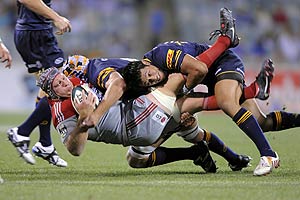
Crusaders' Thomas Waldrom is hammered into the ground by Brumbies players in the Super 14 rugby match at Canberra Stadium, Saturday, Feb. 21, 2009. AAP Image/Alan Porritt
With just four rounds remaining, the Super 14 round games are almost over. Yet, there is no clear favourites to win the title. The standard of this year’s competition is down and it is showing in the TV ratings.
In comments posted on the Roar, it seems that we have all been holding our breaths since the first round for the competition to kick into another gear of play and entertainment. No matter who we follow, it seems that our team has played more poor games than good.
Heyneke Meyer, an outstanding coach, has explained that the Super 14 has been diluted over the last two years by the number of players plying their trade in Europe. The New Zealand teams have been affected the most.
Eddie Jones has also commented that the standard has dropped away.
But why is this? Is it a product of the environment, the laws, or the coaching strategy?
Lets talk about the environment first.
Currently there are four new head coaches experiencing their first year at the helm. Add to this an additional five head coaches in their second year as head coach, and that is a lot of intellectual property that has walked away from the Southern Hemisphere’s premier rugby competition.
A good example of this is Ewen McKenzie’s departure from Waratahs.
He is smart coach who promoted a lot of young players into the backline last season. He has a wealth of Super 14 experience and, I dare say, given the standard of the competition this season, the Waratahs would have won it easily with Ewen in charge.
Money cannot buy experience, and it seems that unlike the player rosters at the various franchises, there is no succession planning of coaches.
This is a little silly given that the Super 14, I believe, is one of the hardest competitions to win on the sheer basis of the amount of travel involved.
Such is the nature of the business that new coaches, and those in their second year, need to establish themselves by getting results quickly. To do this, coaches will either consciously or subconsciously play for the win only.
And that is often conservative rugby, given their experience in the competition.
Reading many of the posts about the Australian teams, supporters are saying we have such great young talent but we are not performing. Look around the competition – the Waratahs, the Reds, the Brumbies, the Blues, the Crusaders, the Highlanders, the Bulls and the Cheetahs have all introduced a lot of young talent.
The exodus of players to Europe and retirement has left the competition poorer in mature skill, experience and game breakers.
If the young players can be retained, then the Super 14 in 2011, which also happens to be a World Cup year, will be a cracker.
There has been much debate about the ELV’s, but lets discuss their factual impact on the game.
Lineout quality possession has diminished considerably with less lineouts, a greater defensive contest focus, given the unlimited numbers in the lineout, and most teams are being forced to win the ball at number two in the lineout, which vastly limits the attacking options and ultimately gives the defence the upper hand.
There are a greater number of free kicks and penalties awarded against the attacking team and therefore some teams have conservatively stopped playing possession rugby and opted to play field position.
Add to this a subtle yet significant tactical increase in the defensive systems, which slow the ball up greatly at the tackle contest, and teams can play too much rugby with a young immature skill base giving the defence an advantage in tactics and in law.
Not being able to pass back into the 22 to kick into touch on the full has had a huge impact on the Australian teams, as generally we have not been a kicking nation.
Most of the Australian teams only have a one-kick strategy.
Most of the South African teams understand the concept of a three-kick strategy to manipulate the opposition to a point where they can attack. If you watched the Bulls against the Brumbies on Saturday night, they scored a classic try because they understood the three-kick strategy.
Kicks per game have risen to sixty and most are down the opposition’s throat. What has happened to the long kick and the weighted kick with good pressure?
It seems that the competition has gone contestable kick mad, which brought fair results early in the competition, but due to the defensive strategies applied by most teams, it has released more receivers to the backfield to play aerial ‘ping pong’.
Combine all of these points together, and a general conservative approach in this year’s competition to counter attack, and unfortunately supporters are turning away from the game disappointed with their team.
I read a lot about how good the Heineken Cup standard is, but like the Super 14, I have only seen a handful of great games so far.
My advice is to hang in there, give the coaches and the players time to mature their skills, strategy and confidence working towards the next World Cup, and we are going to see some great rugby.
Until then keep supporting your team – they need it! – and cherish the good games.





























































































